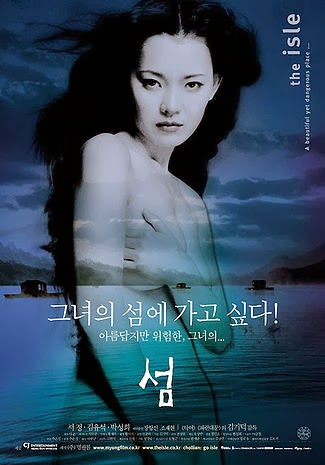This is Kim Ki Duk's bizarre isolationist universe of misogynist fishermen, smalltown prostitutes and a charged, mute female Charon figure. Animals are smacked, handfuls of fishhooks are swallowed and inserted, vengeful jealousies flare out of nowhere, attempts at tendresse are trampled in a clatter of outboard engines and scooter motors. Grey rain and light fogs obscure motive and consequence.
Sunday, 29 September 2013
Song Kang-Ho as Policeman
"Tell Me Something" is the story of the unforgotten crime of sexual abuse and forced termination of pregnancy in a barely teenaged daughter, followed by the brutal and surgical murder and dismemberment of a nondescript group of the woman's wannabes and ex boyfriends.
The investigating police officer (the always charismatic Han Suk-Kyu) is even at the outset an unreliable, emotionally compromised and damaged figure, who is run over, beaten up, doused in rain and sour blood, and takes the form of a hopelessly impotent yet charmed and charming male agent of authority. His superiors are a distant and incompetent set of striding suits and stern stares.
The force of the film is a blankly terrifying, vengeful female figure, Soo-Yeon, who enlists another woman in the killing of the anonymous suitors, and then disposes of her in front of the police. when she tries to take the blame for the killings, in a pseudo-denoument to the tune of Nick Cave's "Red Right Hand" playing in a Seoul branch of Tower Records.
By the close, several dead men have had their bodies cut up, dumped in black plastic binliners in public and inadvertently discovered (one memorably in the middle of a 2 lane highway causes an ugly pile-up), the detective is collapsed outside the murderers' house, while she is on a plane to Paris.
*The most human relationship in the film, that between detectives Cho and his avuncular sidekick Detective Oh, ends gruesomely as Cho hears Oh die on the phone at the second woman's hands; the second (and obviously tomboyishly- styled) woman is then shot by Soo Yeon at Tower Records (with the gun symbolically and superfluously given her by Cho).
The theme of the bleakly comic botching of a police operation is far closer to the centre of "Memories of Murder", which is powered but burdered by being based on the true story of a notorious and unsolved sequence of serial murders. The figures of the police officers (particuarly the brilliantly intransigent, lazy but conscience-stricken Song Kang-Ho) are far too embroiled in internecine bickering, territorial disputes and work-avoidance to get close enough to the dead women to have their identity jolted.
Subscribe to:
Comments (Atom)


